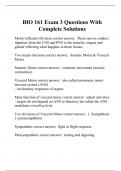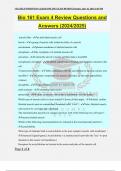Bio 161 exam - Study guides, Class notes & Summaries
Looking for the best study guides, study notes and summaries about Bio 161 exam? On this page you'll find 111 study documents about Bio 161 exam.
Page 2 out of 111 results
Sort by
BIO 161 Exam 3 Questions With Complete Solutions.
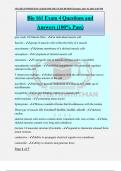
-
Bio 161 Exam 4 Questions and Answers (100% Pass)
- Exam (elaborations) • 7 pages • 2024
- Available in package deal
-
- $11.49
- + learn more
Bio 161 Exam 4 Questions and Answers (100% Pass)
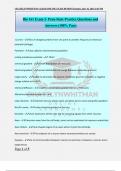
-
Bio 161 Exam 2- Penn State Practice Questions and Answers (100% Pass)
- Exam (elaborations) • 5 pages • 2024
- Available in package deal
-
- $11.49
- + learn more
Bio 161 Exam 2- Penn State Practice Questions and Answers (100% Pass)
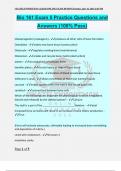
-
Bio 161 Exam 5 Practice Questions and Answers (100% Pass)
- Exam (elaborations) • 5 pages • 2024
- Available in package deal
-
- $11.49
- + learn more
Bio 161 Exam 5 Practice Questions and Answers (100% Pass)
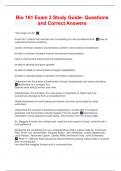
-
Bio 161 Exam 3 Study Guide- Questions and Correct Answers
- Exam (elaborations) • 14 pages • 2024
-
Available in package deal
-
- $9.49
- + learn more
*The Origin of Life* Know the 7 criteria that must be met if something is to be considered alive. have an organized structure (anatomy) contain chemical reactions coordinated to perform vital functions (metabolism) be able to maintain constant internal environment (homeostasis) react to internal and external stimuli (responsiveness) be able to develop and grow (growth) be able to adapt to environmental changes (adaptability) be able to reproduce/pass on genetic information (reproduction)...
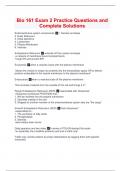
-
Bio 161 Exam 2 Practice Questions and Complete Solutions
- Exam (elaborations) • 15 pages • 2024
-
Available in package deal
-
- $9.99
- + learn more
Endomembrane system components 1. Nuclear envelope 2. Endo Reticulum 3. Golgi aparatrus 4. Lysosomes 5. Plasma Membrane 6. Vesicles Endoplasmic Reticulum -extends off the nuclear envelope -a network of membrane bound compartments *rough ER and smooth ER* Exocytosis when a vesicles fuses with the plasma membrane *allows the vesicle to empty its contents into the extracellular space OR to deliver proteins embedded in the vesicle membrane to the plasma membrane* Endocytosis when a vesicles buds...
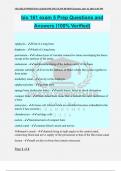
-
bio 161 exam 5 Prep Questions and Answers (100% Verified)
- Exam (elaborations) • 4 pages • 2024
- Available in package deal
-
- $10.49
- + learn more
bio 161 exam 5 Prep Questions and Answers (100% Verified)
Bio 161 Exam 4 Review Questions and Answers (2024/2025)
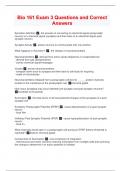
-
Bio 161 Exam 3 Questions and Correct Answers
- Exam (elaborations) • 9 pages • 2024
-
Available in package deal
-
- $8.99
- + learn more
Secretion definition - the process of converting an electrical signal (presynaptic neuron) to a chemical signal (synapse) and then back to an electrical signal (post synaptic neuron) Synaptic Activity - allows neurons to communicate with one another What happens in Secretion? - the release of neurotransmitters Neurotransmitters - derived from amino acids (dopamine or norepinephrine) - derived from gas (acetylcholine) - carries chemical signal/messages Vesicle - stores neurotransmitters - tra...
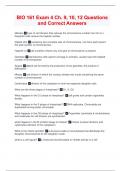
-
BIO 161 Exam 4 Ch. 9, 10, 12 Questions and Correct Answers
- Exam (elaborations) • 11 pages • 2024
-
Available in package deal
-
- $8.99
- + learn more
Meiosis Type of cell division that reduces the chromosome number from 2n to n. Daughter cells receive the haploid number Diploid (2n) containing two complete sets of chromosomes, one from each parent. the total number of chromosomes. Haploid (n) cell condition where only one type of chromosome is present Gametes reproductive cells (sperm and egg in animals). usually have the haploid number of chromosomes Zygote diploid cell formed by the production of two gametes; the product of fertilizatio...

That summary you just bought made someone very happy. Also get paid weekly? Sell your study resources on Stuvia! Discover all about earning on Stuvia

